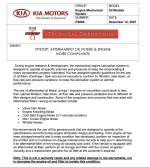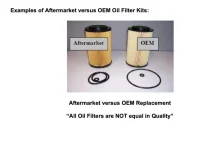This just shows how Kia, in their quest for relevancy in the American market (playing with the big boys) tried to establish a control early on beginning with the very basic (engine maintenance)--oil and oil filter! May not be an OEM oil but clearly an OEM oil filter. This is a basic preventative maintenance (they hoped new owners will adhere to) that has long term consequences in the life of their vehicles--that also affects their 10 year warranty which in turn costs them money. Remember, they are establishing trust with the American public so they wanted their cars to last. Having said that, the GDI engines that calls for a more specific oil viscosity--requiring oil and fuel industry's compliance in accordance to the car manufacturer's specifications (and EPA requirement, of course! The main reason for all these ingenuities and inventions, lol)) is a major factor in engine longevity, hence ACEA sequence! This just makes a lot of sense! Here, I quoted their 15 year old bulletin (see attached images).
"During engine research & development, the mechanical engine lubrication system is designed to operate at specific volumes and pressures to keep the reciprocating & rotary components properly lubricated. Kia has assigned specific guidelines for the use of oil filters (Cartridge / Spin-on) and oil viscosity to conform to; filtration, leak down, oil flow rate and pressure variations, to keep the lubrication system at optimal performance."
"The use of aftermarket oil filters/ o-rings / improper oil viscosities could result in less then optimal filtration, leak down, oil flow rate and pressure variations due to different oil filter designs and construction. Some of the symptoms and concerns that may arise with aftermarket filters / wrong oil viscosities include:"
"During engine research & development, the mechanical engine lubrication system is designed to operate at specific volumes and pressures to keep the reciprocating & rotary components properly lubricated. Kia has assigned specific guidelines for the use of oil filters (Cartridge / Spin-on) and oil viscosity to conform to; filtration, leak down, oil flow rate and pressure variations, to keep the lubrication system at optimal performance."
"The use of aftermarket oil filters/ o-rings / improper oil viscosities could result in less then optimal filtration, leak down, oil flow rate and pressure variations due to different oil filter designs and construction. Some of the symptoms and concerns that may arise with aftermarket filters / wrong oil viscosities include:"
- Valve train Noise
- Engine Knocking Noise
- Cold Start Engine Noise (2-7 seconds duration)
- Idle / Cruise Engine Noise
- Whistle Noises
"Kia recommends the use of Kia genuine parts that are designed to operate at the specifications set forth during engine lubrication design and testing. If the engine oil has been changed recently and a noise condition has developed, perform an inspection of the oil filter and or Customer oil change maintenance records to help you in determining if an aftermarket filter or the wrong oil viscosity was used. If the vehicle is equipped with an aftermarket oil filter, perform an oil change and filter with the correct oil grade / viscosity and a replacement genuine Kia oil filter at the customer’s expense."






